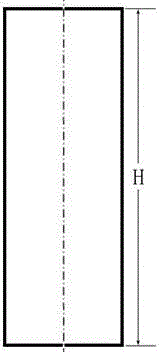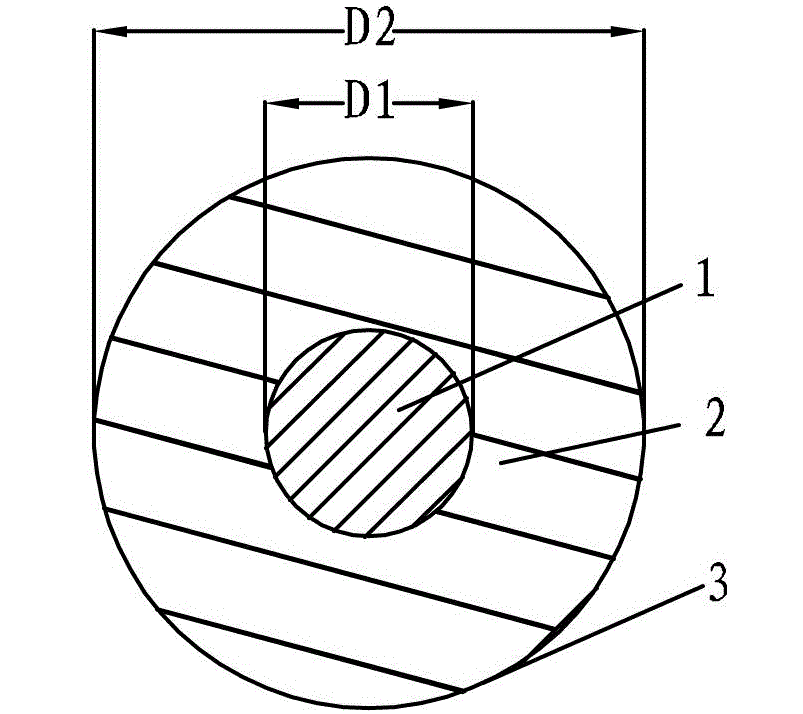Anti-abrasion anti-etching alloy rod production method through powder metallurgy process
A powder metallurgy and corrosion-resistant alloy technology, which is applied in the field of powder metallurgy process for preparing wear-resistant and corrosion-resistant alloy bars, can solve the problems of increasing the overall cost of the alloy, adverse effects of alloy performance, segregation of alloy elements, etc., so as to reduce the increase in the oxygen content of the alloy. , reduce production costs, accelerate the effect of floating removal
- Summary
- Abstract
- Description
- Claims
- Application Information
AI Technical Summary
Problems solved by technology
Method used
Image
Examples
Embodiment 1
[0033] This embodiment relates to a method for preparing wear-resistant and corrosion-resistant alloy rods by powder metallurgy, including the following preparation steps:
[0034] Step 1. Prepare an iron-based alloy powder with wear-resistant and corrosion-resistant properties. The mass percentage of the chemical composition of the alloy is C: 2.68%; W: 0.5%; Mo: 1.3%; Cr: 16.5%; V: 8.3% ; Nb: 2.0%; Co: 0.2%; Si: 0.6%; Mn: 0.3%; N: 0.12%; O: 0.006%; The powder metallurgy process steps are as follows:
[0035] a. Transfer the molten steel to the ladle, and the loading weight of the molten steel is 3 tons;
[0036] b. The upper surface of the molten steel in the ladle is covered with ladle mold slag, and the ladle mold slag is heated to maintain the superheat of the molten steel at 110°C; nitrogen gas is introduced at the bottom of the ladle to stir the molten steel;
[0037] c. Flow the molten steel into the tundish preheated to 850°C through the molten steel diversi...
Embodiment 2
[0044] This embodiment relates to a method for preparing wear-resistant and corrosion-resistant alloy rods by powder metallurgy, including the following preparation steps:
[0045] Step 1. Prepare an iron-based alloy powder with wear-resistant and corrosion-resistant properties. The mass percentage of the alloy chemical composition is C: 2.08%; W: 0.5%; Mo: 1.5%; Cr: 16.5%; V: 4.6% ; Nb: 1.8%; Co: 0.3%; Si: 0.6%; Mn: 0.5%; N: 0.08%; O: 0.006%; The powder metallurgy process steps are as follows:
[0046] a. The molten steel is transferred to the ladle, and the loading weight of the molten steel is 5 tons;
[0047] b. The upper surface of the molten steel in the ladle is covered with ladle mold slag, and the ladle mold slag is heated to maintain the superheat of the molten steel at 150°C; argon gas is introduced at the bottom of the ladle to stir the molten steel;
[0048] c. Flow the molten steel into the tundish preheated to 1000°C through the molten steel diversion pipe at ...
Embodiment 3
[0055] This embodiment relates to a method for preparing wear-resistant and corrosion-resistant alloy rods by powder metallurgy, including the following preparation steps:
[0056] Step 1. Prepare an iron-based alloy powder with wear-resistant and corrosion-resistant properties. The mass percentage of the chemical composition of the alloy is C: 2.1%; W: 0.5%; Mo: 1.5%; Cr: 22.0%; V: 4.0% ; Nb: 1.0%; Co: 0.2%; Si: 0.8%; Mn: 0.4%; N: 0.05%; O: 0.008%; The powder metallurgy process steps are as follows:
[0057] a. Transfer the molten steel to the ladle, and the loading weight of the molten steel is 7 tons;
[0058] b. The upper surface of the molten steel in the ladle is covered with ladle mold slag, and the ladle mold slag is heated to maintain the superheat of the molten steel at 140°C; nitrogen gas is introduced at the bottom of the ladle to stir the molten steel;
[0059] c. Flow the molten steel into the tundish preheated to 1200°C through the molten steel diversion pipe ...
PUM
| Property | Measurement | Unit |
|---|---|---|
| diameter | aaaaa | aaaaa |
| thickness | aaaaa | aaaaa |
Abstract
Description
Claims
Application Information
 Login to View More
Login to View More - R&D
- Intellectual Property
- Life Sciences
- Materials
- Tech Scout
- Unparalleled Data Quality
- Higher Quality Content
- 60% Fewer Hallucinations
Browse by: Latest US Patents, China's latest patents, Technical Efficacy Thesaurus, Application Domain, Technology Topic, Popular Technical Reports.
© 2025 PatSnap. All rights reserved.Legal|Privacy policy|Modern Slavery Act Transparency Statement|Sitemap|About US| Contact US: help@patsnap.com


